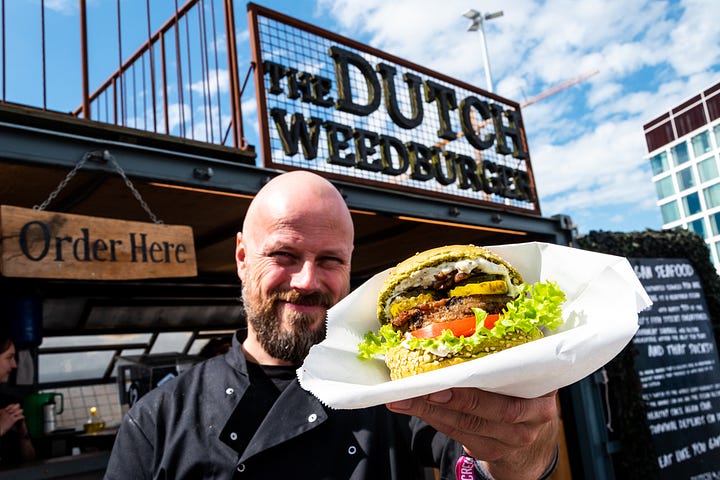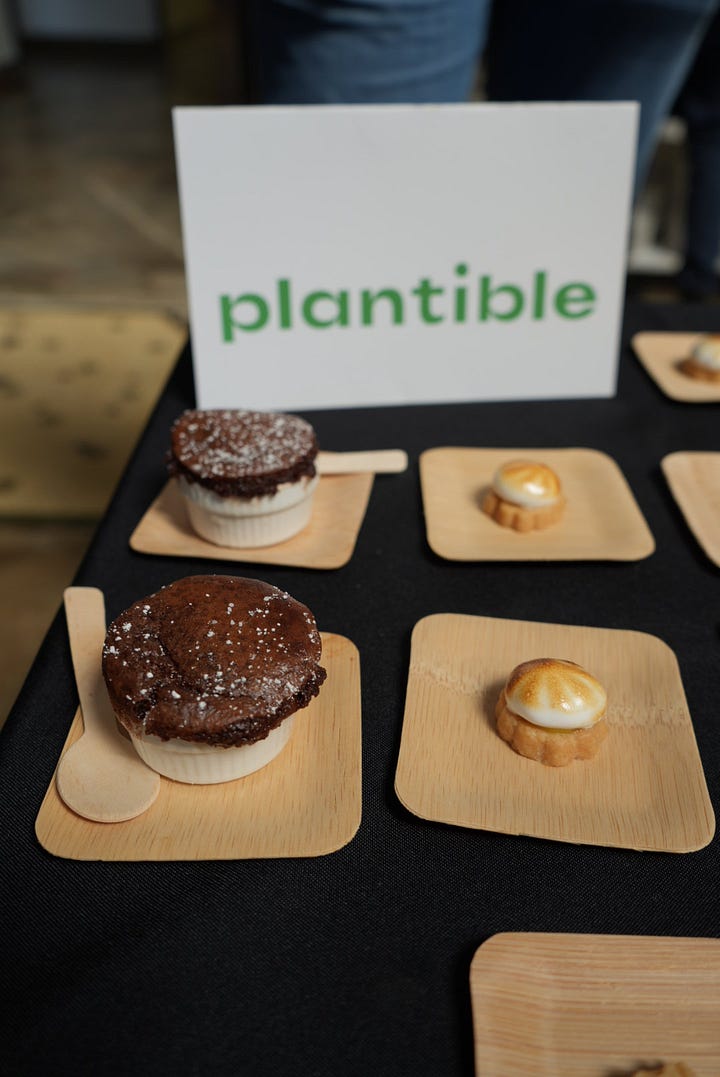An ocean of opportunity for alt proteins
Explore the latest food innovations using seaweed, algae, and other aquatic plants
Can you guess what the plant-based foods in these pictures have in common?




They were all made with seaweed, algae, or other aquatic plants.
While these plants might be the most obvious ingredients for a realistic plant-based burger or bacon product there’s more beneath the surface than ‘meats’ the eye. To put it ‘shrimp’ly - aquatic plants hold the potential to be a true win-win food source for people and the planet.
Aquatic plants are protein-packed, nutrient-dense foods that do not require arable land or fertilizer to grow. Sustainable sources of protein and nutrients are vital climate and biodiversity solutions for a global population that is expected to reach nearly 10 billion by 2050.

The potential economic benefits of seaweed are hard to ignore as well. Seaweed is the fastest growing aquaculture sector in the United States. By 2027, the global seaweed market could be worth $95 billion, up from $60.5 billion in 2023.
In recent years, food industry innovators have been harnessing the power of aquatic plants to create delicious plant-based meat products. We’ve rounded up several of the latest breakthroughs that are ‘shore’ to make a splash. Let’s take a deep dive into an ocean of possibilities with seaweed, algae, and duckweed.
Where others see weeds, we see a sustainable source of protein
Humans use seaweed in a multitude of applications, from cosmetics to pharmaceuticals. Researchers are even exploring the use of seaweed as a sustainable biofuel source. However, one of its most promising use cases is as a nutritious, sustainable, and versatile ingredient in plant-based meat. One key player – Umaro Foods – is using red seaweed to make a plant-based version of one of the most coveted meats on the market: bacon.
Umarorecently secured $3.8 million in seed funding to help ramp up manufacturing and support the future retail launch of their seaweed-based bacon. According to founders Beth Zotter and Amanda Stiles—who also happen to be previous GFI grantees—Umaro's seaweed bacon has a meaty taste, color, and texture thanks to the company’s proprietary red seaweed protein and combination of patent-pending extraction processes that maintain high amounts of plant-based fat in the final product. The startup plans to use the funding to transition from a batch to a continuous production process that will reduce the production costs of their seaweed-based bacon to roughly half the cost of conventional animal-based bacon. Umaro is currently working with around 250 food service providers with plans to make their retail debut at a leading West Coast retailer later this year.
Umaro isn’t the only company innovating with red seaweed. Aquaculture startup Sea&Believe recently established its first seaweed farm in Connemara, Ireland. The company specializes in creating ingredients for both the food and skincare sectors and is utilizing Palmaria palmata, a red seaweed indigenous to the Atlantic. This seaweed is highly nutritious and has a whopping 23 percent protein content, exceeding the average of 17 percent commonly found in fish.
Another company looking to expand seaweed cultivation is North Sea Farmers. They are testing the viability of growing seaweed between offshore wind farm turbines in the Netherlands and will also use the site to research seaweed’s carbon capture potential. This project received €1.5 million from Amazon in 2023.
In the United Kingdom, THIS is using seaweed to enhance its plant-based chicken thighs. Termed as "hyper-realistic," these plant-based thighs incorporate three patent-pending technologies to mimic the intricate three-dimensional makeup of meat. Utilizing extrusion technology, soy and fava bean protein are processed to achieve a fibrous texture akin to meat, while the addition of olive oil-based fat enhances juiciness. Furthermore, a seaweed layer is incorporated to replicate the structure and texture reminiscent of chicken skin.
More companies are finding the ‘algae’rithm for success
Algae are fascinating and diverse organisms, ranging from microscopic unicellular species to large, complex seaweeds. They act like the gardeners of the sea, using sunlight to make oxygen and forming the base of the food chain for countless marine creatures. Increasingly, algae are making their mark in terrestrial food chains as well.
Recognizing the need for more diversified protein production, Barcelona-based startup POSEIDONA is turning to an invasive, harmful species of algae that has taken over part of the oceanic ecosystem off the coast of France and Spain. Founders María Cermeño and Sònia Hurtado are leveraging their expertise in protein extraction to turn this invasive seaweed and other algal sidestreams into a protein concentrate with a natural umami flavor. POSEIDONA is also developing a program that would employ fishermen to collect seaweed, providing another revenue stream in the face of a declining fish population that is resulting in less work for local fishers.
POSEIDONA is not the only European company tapping into the power of algae. Fueled by €2 million in pre-seed financing, French startup Edonia is gearing up to launch its first product: a texturized, protein-rich ingredient made from microalgae biomass. Edonia has developed what they describe as a "game-changing" process that transforms microalgae into an umami-flavored food ingredient with over 30 percent protein and a meat-like texture, making it ideal for plant-based meat formulations. The company plans to launch in Europe first and then expand to other global markets through strategic partnerships.
With countless innovations across Europe, this region seems to be ‘sea’zing this opportunity for a brighter food future with help from government agencies. As part of an ongoing effort to position algae as a resource, the EU’s European Maritime and Fisheries Fund supported a €2 million “Seafood Alg-ternative” project to develop seafood derived from microalgae and other sources. The United Kingdom’s National Resources Institute (NRI), Imperial College of London (ICL), and startup Arborea are also partnering to develop sustainable microalgae with improved flavor profiles.
If it walks like a duck and quacks like a duck
Then it should live a full and happy life as a duck – especially when plants like duckweed can act as a sustainable source of non-animal protein. Duckweed is a small, floating aquatic plant that reproduces rapidly, forming dense colonies on the surface of ponds and slow-moving water bodies. Also known as water lentils or Lemna, duckweed is a nutrient-dense plant containing up to 45 percent high-quality protein.
Recognizing its value, Sustainable Planet is focused on utilizing desertified land to grow duckweed in a large-scale production process that allows the plant to be grown in saline water. The company is doing this in countries like Mozambique, using land that is otherwise unsuitable for agriculture and employing hundreds of smallholder farmers in the process.
While some researchers are cultivating aquatic plants directly, others are exploring applications of their fractionated components. Plantible and ICL teamed up to replace methylcellulose with ROVITARIS, an alternative made with RuBisCO from duckweed. Plantible also launched RubiWhisk, a plant-based egg replacement made with RuBisCO.
“Aquatic plants might be key in unlocking one of the world’s most sought-after proteins – RuBisCO – A protein that is nutritionally and functionally superior to both animal and plant proteins, is allergen free, and if produced properly, is neutral in taste & color. This protein will be a critical component in the food industry’s transition to a sustainable agri-food ecosystem without animal harm and social disruption.”
- Tony Martens Co-Founder, Plantible Foods
A ‘fintastic’ food opportunity with a rich history
Need another reason to love seaweed? While the majority of seaweed today is produced in China, Indonesia, and the Philippines, seaweed farming is a global economic opportunity. In Tanzania, for example, it is the country’s third largest export, employing over 25,000 farmers—80 percent of whom are women.
A recent analysis hypothesized that algae farms could produce all the protein the world will need in 2050. However, despite massive potential benefits to people and the planet, research on the use of aquatic plants as a sustainable food source is underfunded. To meet the growing demand for this superfood in sustainable and cost-effective ways, this sector needs further R&D, funding, scaling, and commercial development.
While some of the products we’ve discussed may seem futuristic and foreign—particularly to those who eat a traditional, western diet where finding seaweed anywhere on the plate is rare—eating seaweed is more of a return to our roots than it may initially appear.
Early coastal communities, such as those in ancient China, Japan, and Ireland, relied on seaweed as a vital food source for people and livestock as well as for its medicinal properties. A study published in Nature Communications found chemical traces in the remains of ancient Europeans, suggesting that algae once provided many of the nutrients and protein they needed to survive. Though the history of aquatic plants as a food source dates back thousands of years, they have almost disappeared from the modern Western diet.
We think they are due for a comeback. Where others see aquatic weeds, we see the potential to support coastal communities around the world while satisfying hunger with sustainable, nutritious plant-based protein at the same time.
Let’s ‘kelp’ put this superfood on the map.
Don’t ‘krill’ our vibe. Subscribe for updates on the latest and greatest alt protein news.







Great article!
One note though: If POSEIDONA is in Barcelona, isn't it a Spanish company rather than a French company?
Really enjoyed reading this article. I want to try out everything that was mentioned! Can't wait for Alt Proteins and marine ones in particular to go mainstream.